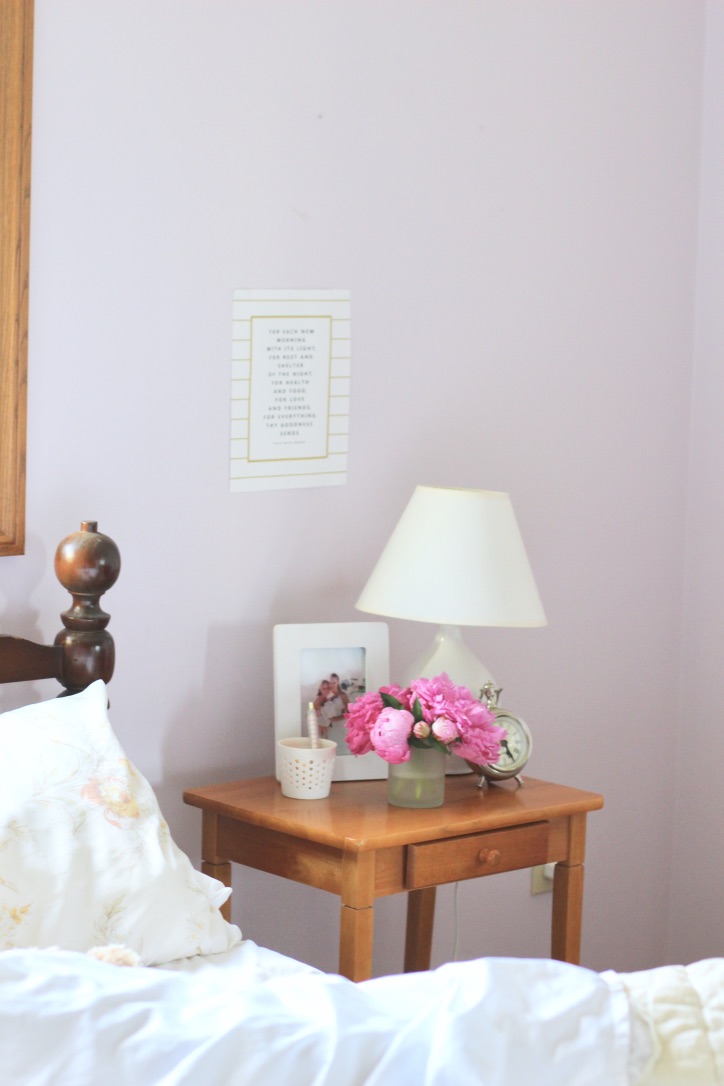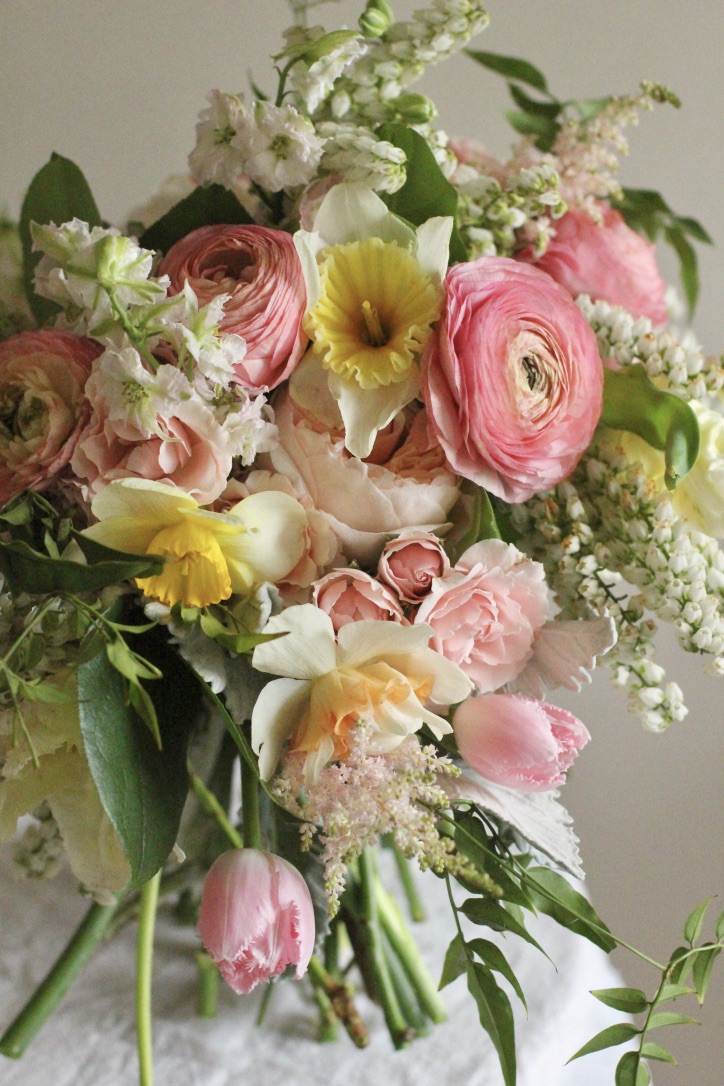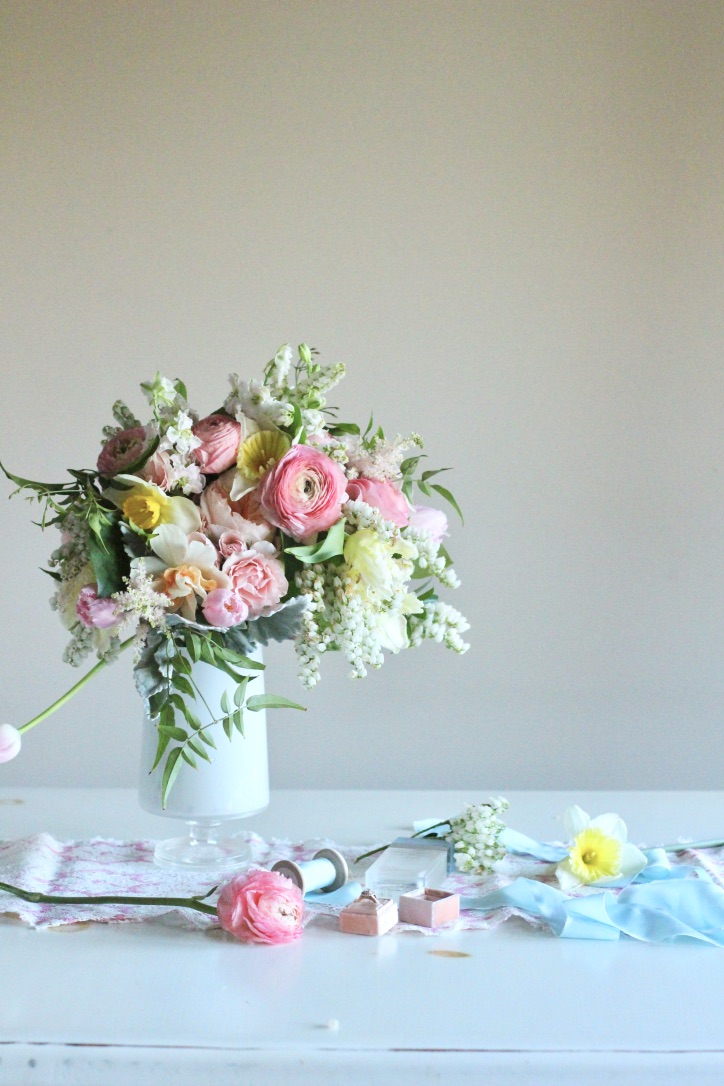S I M P L E T I P S F O R B E G I N N E R S
If you're a beginner gardener, aspiring houseplant expert or just want a few blooms or vegetables for your table, the whole process can seem very intimidating at first. I'd encourage anyone to start small, give it a try and use these few basics for success. The beauty and wonder of watching something grow is much greater than any fear of failure.
Overview
1. SOIL | Give your plant nutritious soil and room to grow
2. LIGHT | Choose a spot where there is the right amount of light for your plant
3. WATER | Keep your plant moist (know how much your plant wants,
some like to be a little dry like succulents and houseplants)
4. FOOD | Feed your plants with fertilizer as needed
5. MAINTENANCE | Maintain your plants by weeding, pinching,
deadheading, staking and pest control
s c r o l l t o b o t t o m f o r
Tips for Houseplants
Favorite Easy to Grow Flowers
PLANTING
S O I L
Your soil is what gives the plant nutrition and encourages roots to grow.
G R O U N D | The more nutrition you have in your soil the better your plant will do. This is the reason that plants do their best when planted in the ground - they have more nutrition, more room to stretch out their roots (and the more the roots can grow, the more the plant will grow). It is also a lot easier to keep plants moist there as the ground holds more moisture than a pot will and you don't have to worry about overwatering when you have good soil drainage. If your soil lacks nutrients or is claylike and doesn't drain well, sow compost or organic matter like manure before planting (you can buy a cheap soil kit at a garden center and test it to know exactly what it needs if you like). Work the ground by tilling until fine before planting - this makes it easier for plants to take root. Plant when ground is moist but not soggy, usually a day or two after a rain or heavy watering. Water plants deeply after planting (with exception of dahlia tubers which should be planted when soil is slightly moist, but not watered until leaves emerge as they are susceptible to rot). If planting seeds directly, cover lightly with soil or on top of soil if light is required and water very lightly as to not wash them away. Keep the soil lightly moist until sprouted.
P O T S | For those who don't have access to ground planting, there are still many ways to be successful with potted plants. One of my favorites is the beautiful displays of overflowing flowers they can provide. When planting in a pot, choose one as big as is manageable for you for the most room to grow and moisture retention (less watering). Fill the pot with good potting soil (it is best to buy new each year instead of reusing as the nutrients will be used up seasonally). Mix soil with water in a separate container until it is moist but not dripping wet. Place in pot and plant. (Trying to water dry soil after planting can be messier and harder to measure as the soil shrinks when wet).
L O C A T I O N
Aim for a flat spot with your plant's light requirements
I N C L I N E | The best place for a garden is a flat spot where your soil won't wash out over time and that has good drainage (avoid spots that flood or hold water for more than a couple hours in wet seasons). If you live on a hill or a spot with very poor soil, a great solution is a raised bed.
S U N | Choose a spot appropriate to your plants needs. Most annual flowers and vegetables require full sun which is at least 6 hours of sunlight a day. Others will only flourish in part-shade or shade like tuberous begonia and impatiens. You can see the light requirements on the back of the plants label. If you see that your plant is leaning a certain way, it is because it is not in direct sun and is reaching for light. If using a pot on your porch or in the window, just rotate your pot ever week or two for even growth.
WATERING
Don't overwater pots and generally, water deeply instead of frequently.
Watering can be a tricky thing to master in gardening but once get the basics, it's pretty easy to understand. Some plants need more water than others and some like to dry out partially before being re-watered.
G R O U N D | Plants in the ground will develop deep roots in times of dryness to search out moisture deeper so less watering is required. When you don't have plenty of rain, water your plants by hand. Invest in a rain gauge to see that you garden gets at least 1 inch of water weekly. You can also check the soil to see if there is moisture in the top 6 inches of dirt - if not, it is time to water. Likewise, when you water by hand - it is better to water deeply less often than less more often. Try to soak the soil to 6 inches deep. New plants need more frequent watering. Soil should be kept consistently moist until roots are established; usually daily watering for a couple weeks.
P O T S | For heavy feeders like petunias, I would recommend having a tray for the bottom that will catch water instead of letting it drain out. This will allow the moisture to be retained better and let it keep feeding for a day or two. Water deeply, as needed, until water runs out of bottom instead of a little every day. In summer when it is hot, these heavy feeders may dry out daily in which you should water deeply daily. I like to place these kind of pots outside in areas that catch rainfall so I only have to water in dry periods. Watch that during heavy rain periods that your pot's tray is not full of water for more than a day, if so, empty the tray.
For those plants that don't like too much moisture, like houseplants, choose a pot that has holes on the bottom and can drain. Check the soil with your finger and see if the top two inches are moist, if not you can water. You can also learn to know how heavy the pot is when wet or dry.
G E N E R A L | Try to aim for the root of the plant when watering as opposed to wetting the leaves. It is best to water in the morning or evening so the majority of the water soaking into the ground instead of evaporating, however it will not harm your plants to water them in the sun. See this great list of Watering Myths here.
FEEDING
Plants need a consistent supply of nutrients to stay healthy and full. If your ground soil has good nutrition, especially if you sowed in compost or organic matter, your plants should have plenty of nutrition for the summer. However, you may fertilize as well to encourage even more growth. Some plants require more nutrition than others. If you are growing in pots the nutrients in the potting soil will eventually be used up and you will need to fertilize. You can use a powder fertilizer like Miracle Gro to add to your water or a liquid concentrate like Monty's. Fertilize pots and ground (if needed) once every 7-14 days. Follow instructions on your fertilizer.
MAINTAINING
There are several little things you can do to help your plant to flourish.
W E E D I N G | Keeping weeds under control will ensure that your plants roots aren't being choked out. The best time to weed is a day after a good rain or water watering when the soil is moist and you can pull out weeds easily, root and all - which is your goal. You can keep weeds at bay by putting first a thin layer of straw, then a 2-4" layer of grass clippings (try to use clippings without weeds, especially flowering weeds which hold seeds) or mulch on the ground and around your plants. This is also helpful for moisture retention. Doing this, eliminates weeding for me! I add an extra layer of grass halfway through the summer, adding it around plant stems once they are established. If you prefer to till your soil around your plants throughout the growing season, you can place grass clippings around the base of the plant where the tiller doesn't reach.
P I N C H I N G | Pinching benefits many plants! When plants are starting, once it has developed 4-6 leaves, pinch down to the second set of leaves to encourage other stems to branch out from base, forming a much stronger, and bigger plant. Similarly, for vegetables like tomatoes you can pinch off the flowers it forms until the plant gets significantly large and then allow the flowers to grown and form tomatoes. Doing the same for basil will encourage plant growth. (A plant gives it's energy to its flowers or fruit, so if you pinch them it will give it's energy to the plant and grow bigger which will then provide you with more flowers or fruit). (However, for some plants like corn you want to pinch off everything but base stem so that one strong stem emerges).
S T A K I N G | Some plants, despite pinching, will need staking once they reach a certain height (snapdragons, dahlias, sunflowers, gladiolus). Stake up with a metal pole and tie string (I use clear fish line) around the plant to the pole. It's better to stake before the plant needs it so that you don't find long, hard earned stems fallen over and breaking off.
D E A D H E A D I N G | For most annual flowering plants, remove spent flowers to encourage more flowers to develop. If you don't, the plant will give it's energy to the dead flower head to develop seeds instead of forming new flowers. This works for some perennials like salvia too - in which you should remove all flowers on plant once most are browning (around the end of June in Ohio) and expect a new flush in about two weeks. The secret to keeping those overflowing petunia and calibrachoa pots nice all season long is to pinch off dead blooms (not just pulling out flower from head but pinching the head where the green part is) and giving the whole plant a trim halfway through the season. I like to trim all vines back to the pot in mid July in Ohio.
P E S T C O N T R O L | If you see that your plant leaves or flowers are being eaten by bugs use Seven dust or a similar product to get rid of them. Sprinkle over plant after every rain or once dust has faded.
E A S Y T O G R O W
H o u s e p l a n t s
every houseplant is unique, when choosing find out it's requirements (light, soil, water, humidity & fertilization needs).
houseplants generally like indirect light, minimal watering and humidity. water when top of soil is dry to the touch, don't overwater. if your home is dry, you can mist plants by placing in shower or with spray bottle. fertilize according to plants need (usually once a month, do not over fertilize). if insides of leaves are browning, plant starts to lose color or wilt and soil is wet, it is likely getting too much water. if the edges of leaves are browning and soil is dry, it is likely not getting enough humidity or water. if leaves are yellowing it is likely not getting enough light, don't forget to rotate pots towards light periodically.
- Ferns
- Angel Plants (plants that thrive on little or indirect light)
- Succulents (desert plants, they like to be especially dry, be careful not to overwater. give them as much sun as possible. do very well outside on patio in full sun).
- Fiddle Leaf (Tips here)
A n n u a l F l o w e r s
plant after last threat of frost in garden or flower beds in full sun. give 1 inch of water per week. repeat bloomers - clipping blooms will encourage continuous blooming all summer. all can be direct seeded except (snapdragon, eucalyptus & dusty miller). put seeds in soil and watch them grow! click on flower names to see examples and places to buy.
m a i n
- Zinnia
- Cosmos
- Sunflower
- Dahlia (Follow these few rules and you'll have success: 1. don't plant till ground has reached 50 F at night (after Memorial Day is safe in Ohio) 2. plant in moist but not sopping soil and don't water again until leaves emerge (they are susceptible to rot) 3. place stakes in while plants are still small and attach as it is growing).
f i l l e r
- Snapdragon
- Craspedia Drumstick (yellow billy balls)
- Amaranth (also Love Lies Bleeding)
g r e e n
I hope this was helpful to you!
I know that there were so many things that I didn't know when I began gardening that seemed apparent to others. Inevitably, as you grow, you will learn. Throw a couple things in the ground, don't put pressure on yourself and enjoy the results!
Happy growing & may your life always have flowers!

















